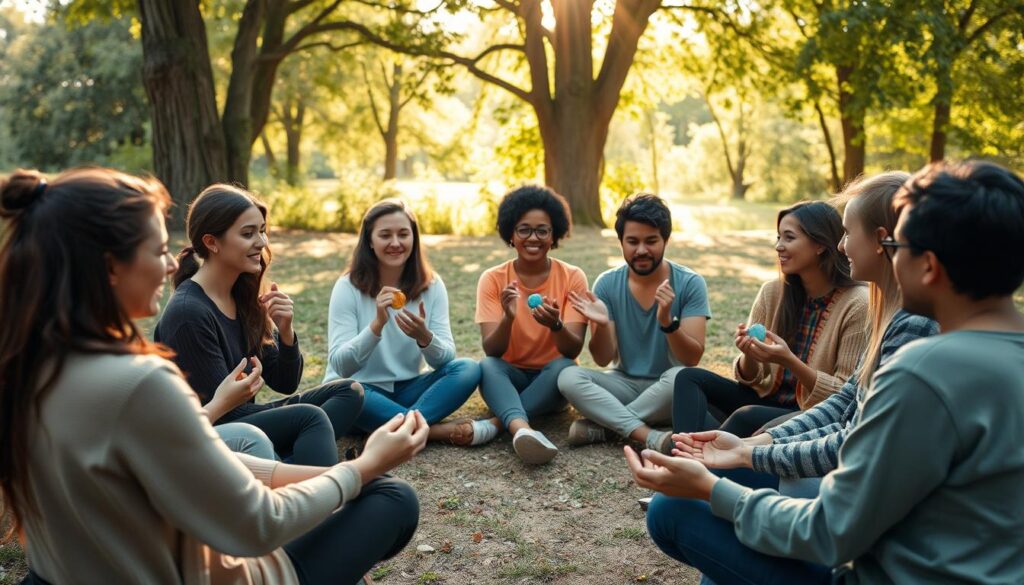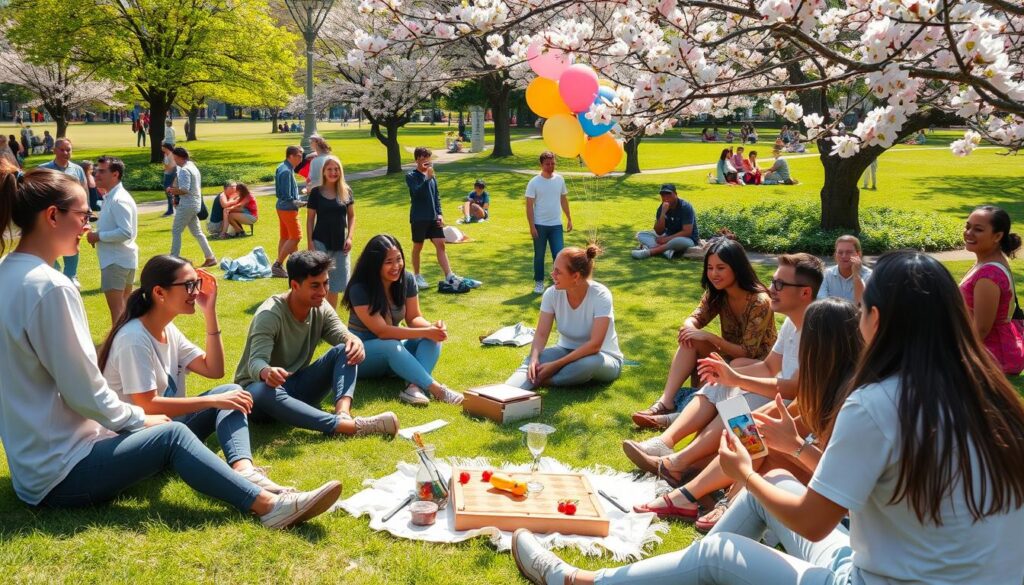Friendship breakups can be as tough as romantic ones. Losing a close friend can feel like a big loss. It can leave you feeling lost and upset.
It might happen because you grow apart or have trouble talking. Ending a friendship is hard and can be confusing.
This article will look at how breakups affect us, why they happen, and how to deal with the feelings. Understanding the grieving process and taking care of yourself can help. This way, you can heal and start making new connections.
Key Takeaways
- Friendship breakups can be just as painful as romantic breakups, involving the loss of a close, platonic bond.
- Common reasons for friendship breakups include growing apart over time and communication challenges or misunderstandings.
- Acknowledging and processing the emotions associated with a friendship breakup is crucial for healing and moving forward.
- Self-care practices, such as rediscovering hobbies and surrounding oneself with positive support, can aid in the healing process.
- Embracing the grieving process and allowing oneself to move at a comfortable pace can help individuals find closure and create new, lasting connections.
The Pain of Losing a Close Friend
Losing a close friend can leave a big hole in your life. With friendship breakups the grief and emotions that follow can be deep. You might feel betrayed, sad, confused, or lonely. It’s key to recognize and deal with these feelings.
Acknowledging the Void and Emotions
Ending a close friendship can make you feel empty and lost. The routines and emotional support you shared are gone. It’s okay to feel angry, hurt, or guilty as you heal.
Reflecting on the Lessons Learned
Even though losing a friend hurts, you can learn a lot from it. Thinking about the friendship and why it ended can teach you a lot. These lessons can help you build better relationships in the future.
“The comfort of having a friend may be taken away, but not that of having had one.”- Seneca
Dealing with the grief of losing a friend is tough. But it can also help you grow and learn about yourself. By facing your emotions and learning from the experience, you can start to heal and move forward.
Why Friendships End
Friendships can end for many reasons. It’s important to know why they do. This helps us deal with these challenges and move on.
Growing Apart Over Time
One big reason friendships end is growing apart over time. As we grow, our interests and life paths change. This can make friends feel like they’re no longer connected.
This slow change can quietly end a friendship. It leaves both sides feeling lost and unsure of how to reconnect.
Communication Challenges and Misunderstandings
Another key reason for friendship breakups is communication challenges and misunderstandings. Even the strongest friendships can struggle when communication breaks down. Unresolved conflicts and misinterpreted messages can lead to a friendship breakup.
Friendships are complex, and their end can be hard to accept. Knowing the common reasons for friendship breakups helps us understand. It lets us heal and move forward.
“Letting go of a friendship is never easy, but sometimes it’s necessary for our own growth and well-being.”
Friendship Breakups
Ending a close friendship can be very hard. It’s a pain that’s hard to explain or deal with. Losing a trusted friend and the memories you shared can leave a big gap in your life.
It’s key to understand how serious a friendship breakup is. These friendships are important, even if they’re not romantic. Ending a friendship can make you feel sad, betrayed, and lonely. It’s okay to feel these emotions deeply.
“The pain of a friendship breakup can be just as acute as the end of a romantic relationship. It’s important to honor the significance of these connections and the impact their loss can have on our lives.”
Friendships can end for many reasons, like growing apart or not being able to talk well anymore. Losing a close friend can really affect you. It takes time, kindness to yourself, and a chance to learn from the experience.
Recognizing the special pain of friendship breakups helps you start healing. It opens the door to making new, important friendships in the future.
Self-Care During the Healing Process
Getting over the loss of a close friend is tough. But, taking care of yourself is key. Finding joy in hobbies and activities can help you heal and find purpose again.
Rediscovering Hobbies and Joy
After a friendship ends, it’s vital to find happiness again. Try old hobbies, new ones, or just enjoy what you love. Finding your passions is a big part of healing.
- Do things that match your interests and values.
- Try new hobbies that catch your eye.
- Make time for thinking and growing.
Surrounding Yourself with Positive Support
Having a good support system is crucial. Talk to friends, family, or join groups for help and advice.
- Find people who support and uplift you.
- Do things that make you feel connected.
- Consider therapy for emotional help.
By focusing on self-care and positive support, you can heal. Remember, healing is a journey. Be patient and kind to yourself as you find your way back to joy and passions.
“The greatest weapon against stress is our ability to choose one thought over another.” – William James
Finding New Connections
After losing a close friend, it’s easy to feel like hiding away. But, taking the brave step to meet new people can help you heal and grow. The rise of digital friendships gives you a chance to meet others who share your interests.
Venturing into Digital Friendships
The digital world has changed how we make friends. Digital friendships let us connect with people far away. This breaks down barriers and creates a sense of community. Online, you can find people with similar interests and start new friendships.
Bumble For Friends App
The Bumble For Friends app is a great way to find new friends online. It’s made just for finding friends, not romantic partners. You can swipe to meet people nearby and start new friendships. The app makes it easy to find and talk to potential friends.
Exploring digital friendships and apps like Bumble For Friends can change your life. By meeting new people, you can start to heal and grow. You’ll build a network of friends who support and enrich your life.
The Value of Past Friendships
Ending a friendship can hurt a lot. Yet, the lessons and memories from these times are very valuable. Even when a friendship ends, the experiences and growth from it can still shape your life.
Keeping friendship memories and lessons from past friendships close to your heart can bring comfort. Looking back on the good times, challenges, and insights from old friends helps you make better connections later on.
“The friends you make along the way are the ones who shape you the most. They leave an indelible mark on your heart, even if the friendship itself doesn’t last forever.”
Past friendships help you grow, teaching you about communication, empathy, trust, and healthy relationships. These lessons can help you make new friendships more meaningful and rewarding.

- Embrace the memories and experiences shared with past friends, as they have contributed to your personal growth.
- Reflect on the lessons learned from past friendships, and apply them to cultivate stronger, more resilient relationships in the future.
- Recognize that the end of a friendship does not diminish its value; the impact it had on your life can continue to be a source of wisdom and growth.
By cherishing friendship memories and lessons from past friendships, you can find comfort, gain insight, and improve your ability to connect with others now and in the future.
Seeking Closure and Moving Forward
Getting closure is key to healing after a friendship ends. For some, talking to the friend one last time helps. But if that’s not possible, finding personal closure is crucial.
Having the Final Conversation
If you’re ready, talking to your ex-friend one last time can be very helpful. It lets you share your feelings and clear up any confusion. Remember to be empathetic, mature, and open to listening.
“The final conversation with my ex-friend was difficult, but ultimately, it helped me find the closure I needed to move forward.”
Finding Your Own Closure
If talking to your ex-friend isn’t an option, you can still find closure on your own. Reflect on what you learned from the friendship. Acknowledge your feelings and understand why it ended. Seeking closure after friendship breakup can mean journaling, talking to someone you trust, or doing rituals to let go.
Finding your own closure is a personal journey. It’s a powerful step in moving forward and healing from losing a close friend.
Expressing Emotions Healthily
Going through a friendship breakup is tough. It brings up many emotions like sadness, anger, or a mix of feelings. Healthy emotional expression is key to healing.
Journaling is a good way to deal with these feelings. It lets you write down your thoughts and feelings privately. This can help you understand yourself better and feel better.
If you need more help, therapy can be very helpful. A therapist can help you work through your feelings. They teach you ways to handle your emotions and understand your friendship better.
Talking openly with friends or family is also important. Sharing your feelings with them can make you feel understood and supported. It helps you feel part of a community during a tough time.
“The greatest healing therapy is friendship and love.” – Hubert H. Humphrey
It doesn’t matter how you choose to deal with your feelings. The most important thing is to face them and process friendship breakup emotions in a way that helps you grow. By doing this, you can come out stronger and more aware of yourself.

Embracing the Grieving Process
Losing a close friend is a deep and complex experience. It’s key to let yourself go through the grieving process. The feelings from losing a friend can be as strong as those from a breakup.
Grieving a friendship loss can bring many emotions. You might feel anger, sadness, guilt, or loneliness. It’s vital to allow time to heal and not rush it. Everyone’s grief is different, so be kind to yourself.
One key step is to acknowledge the void left by the lost friendship. This can be hard, but it’s crucial for closure. Think about what you learned from the friendship and how to use those lessons in future friendships.
“The reality is that you will grieve forever. You will not ‘get over’ the loss of a loved one; you will learn to live with it. You will heal and you will rebuild yourself around the loss you have suffered. You will be whole again, but you will never be the same. Nor should you be the same, nor would you want to.”
Embracing the grieving process is a vital step in healing. By facing your emotions, giving yourself time, and reflecting on what you learned, you can start to move on. You can then form new, meaningful connections in your life.
Putting Yourself Out There
After losing a close friend, it’s key to start building new connections. This is a chance for personal growth. The best way is to be active and explore new things.
Broadening Your Horizons
Try new hobbies, volunteer, or join social events. This can help you build new friendships. You’ll meet people who share your interests and embrace new connections.

Allowing New Friendships to Flourish
When you step out of your comfort zone, be open to making friends. Be ready to engage in conversations. Remember, the best friendships start when we take a chance and embrace new connections.
“The greatest gift of life is friendship, and I have received it.” – Hubert H. Humphrey
By seeking out new social chances, you’ll build new friendships and grow as a person. Enjoy the journey and let your new friendships grow.
Creating Lasting Connections
Making lasting friendships and real connections is key to a happy social life. It’s all about open and honest talk, understanding each other, and growing together. This way, people can build strong, lasting bonds.
Good communication is the heart of lasting friendships. It means listening well, sharing feelings and needs, and talking about tough stuff when needed. When friends can share openly, they can face challenges together and grow closer.
Understanding each other is also crucial. By learning about each other’s lives, values, and views, friends can appreciate their differences. This deep understanding creates a strong connection where both feel truly accepted and valued.
- The Pain of Losing a Close Friend
- Why Friendships End
- Friendship Breakups
- Self-Care During the Healing Process
- Finding New Connections
- The Value of Past Friendships
- Seeking Closure and Moving Forward
- Expressing Emotions Healthily
- Embracing the Grieving Process
- Putting Yourself Out There
- Creating Lasting Connections
